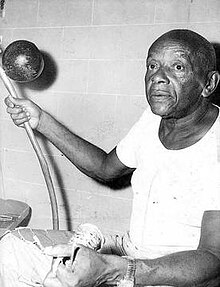Mestre Bimba
| Mestre Bimba | |
|---|---|

O rei da Capoeira
|
|
| Born |
Manoel dos reis Machado November 23, 1899 Salvador, Bahia, Brazil |
| Died | February 5, 1974 (aged 74) Goiânia, Goiás, Brazil |
| Occupation | Creator of capoeira regional, teacher of capoeira, musician, educator, |
| Years active | 1918–74 (56 years of teaching) |
| Parent(s) |
Luiz Cândido Machado (father) Maria Martinha do Bonfim (mother) |
| Relatives |
Manoel Nascimento Machado (Mestre Nenel) (son) Marinalva Nascimento Machado (Dona Nalvinha) (daughter) |
| Website | http://www.mestrebimbafundacao.blogspot.com/ |
Manoel dos Reis Machado, commonly called Mestre Bimba (Portuguese pronunciation: [ˈmɛstɾi ˈbĩbɐ]; November 23, 1899 – February 5, 1974), was a mestre (a master practitioner) of the Brazilian martial art of capoeira.
Machado was born in Salvador in the year 1899 but was not officially registered until 1900, resulting in some confusion surrounding his date of birth. Despite his being born in 1899, 1900 is the date most commonly known and published.
The son of Luiz Cândido Machado and Maria Martinha do Bonfim, Manoel was born at the Bairro do Engenho Velho, Salvador. The nickname "Bimba", whose literal meaning was "phallus", came up due to a bet between his mother and the midwife during his birth. His mother bet that he was going to be a girl and the midwife bet he would be a boy; after he was delivered, the midwife revealed that he was a boy by pointing between his legs at his bimba. In the context of Brazil, "Bimba" also meant "beating".
He started learning capoeira when he was 12 years old, with a Capitão da Companhia Baiana de Navegação (Navigation Captain) from Estrada das Boiadas (present day Bairro da Liberdade) in Salvador, called Bentinho, even though in those days capoeira was still being persecuted by the authorities. He would later be known as one of the legendary founding fathers of contemporary capoeira, the other being Vicente Ferreira Pastinha ("Mestre Pastinha"), the father of modern capoeira angola.
Machado was a coal miner, carpenter, warehouse man, longshoreman, and horse coach conductor, but mainly a capoeirista.
At 18, Bimba felt that capoeira had lost all its efficacy as a martial art and an instrument of resistance, becoming a folkloric activity reduced to nine movements. It was then that Bimba started to restore movements from the old capoeira (later known as Angola), added movements from an extinct African fighting style called batuque – a type of martial art that he learned from his father (of which his father was a champion), as well as introducing movements created by himself. Bimba was the 1st to create a method of teaching to help facilitate learning because until then, capoeira was only learned by watching and participating in the roda. This was the beginning of the development of capoeira regional.
...
Wikipedia
